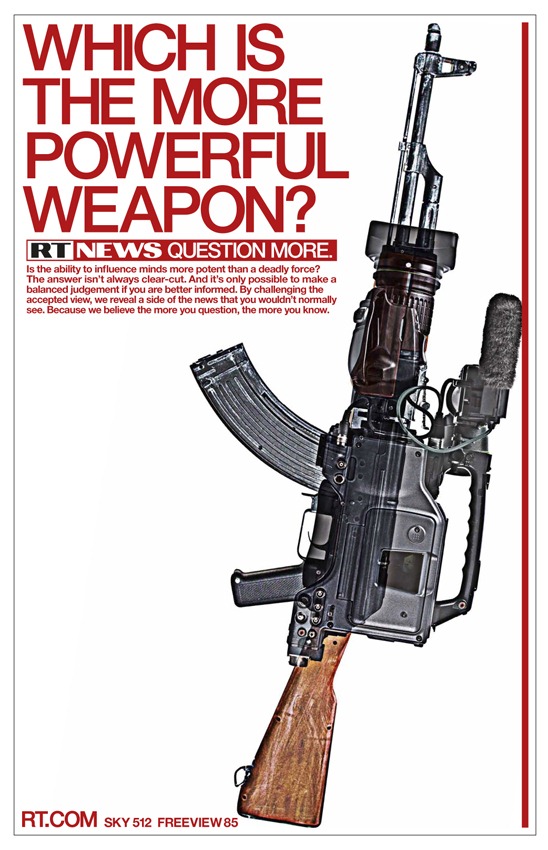Cpl Kendall wrote:#3 is pretty hilarious given the Russians actions in Chechnya.
I think their still tearing into Obama, because:
1: He's a Yank
2: A pretty big disappointment.
I think in that one they're saying that the video camera is worse than the guns.
As for Obama. I found this, which might explain a lot of it.
The main obstacle to stain-free relations between the US and Russia remains the question of missile defense. This was the brainchild of the Bush administration, although its antecedents reach back to former US President Ronald Reagan and his much-touted Stars Wars program.
Post-9/11, with George W. Bush at the wheel of America's War Machine, it was decided that Eastern Europe needed a US missile defense system bolted down in its backyard to guard those peace-loving people from a possible sneak attack by some rogue nation, usually identified as Iran or North Korea.
Now it does not take a military genius to see that if one side builds a huge shield this may cause concern for those who don't have such a shield. The best they (read, Russia) can do in such a situation is to build a bigger sword in the hope of making their hypothetical opponent (in this case, America) behave rationally due to the belief that you (Russia) will be able to smash their (America's) expensive shield to smithereens. Quite simple, really.
Naturally, Moscow responded optimistically to Barack Obama's announcement in September that he would "scrap" his predecessor's plans for a missile defense in Europe, which would have seen 10 ballistic missile interceptors in Poland and a sophisticated radar station in the Czech Republic. It would also have seen Russian missiles deployed in Kaliningrad, on the Polish border, as a retaliatory measure.
But "shelving" the original plan did not mean scrapping it altogether. In fact, the Obama administration announced almost immediately that it would, after "making a reassessment of the modern threats," introduce its own missile defense system.
Although precious little information has been made available about the new plan, it is believed to entail the deployment of US cruisers and destroyers equipped with sophisticated Aegis radars and antimissile interceptors in the eastern Mediterranean and North Sea.
By 2015, the plan envisions interceptors being deployed on land with additional radars in Europe - possibly in the Caucasus - to monitor incoming rockets from lord knows where.
This new plan was supposed to calm Russia's fears about the Bush plan. It didn't. In fact, Robert Gates, US Secretary of Defense, writing in The New York Times, argues that the new system "provides us with greater flexibility to adapt as new threats develop and old ones recede."
"In the first phase, to be completed by 2011, we will deploy proven, sea-based SM-3 interceptor missiles - weapons that are growing in capability - in the areas where we see the greatest threat to Europe," he beamed.
"The second phase," Gates continues to beam, "which will become operational around 2015, will involve putting upgraded SM-3s on the ground in Southern and Central Europe. All told, every phase of this plan will include scores of SM-3 missiles, as opposed to the old plan of just 10 ground-based interceptors. This will be a far more effective defense should an enemy fire many missiles simultaneously."
Naturally these developments are of concern to the Russians, who have been provided little information about the system. More importantly, Washington's insistence on secrecy over the program is holding up the ratification of a new Strategic Arms Reduction Treaty (START), which US and Russian diplomats have been trying to sign since the original document expired in December.
Prime Minister Vladimir Putin told a group of reporters in December that Russia will build new weapons to offset the planned US missile defense and urged Washington to share detailed data about its missile shield so that START may continue. Putin then candidly summed up US missile defense plans for the region and the dilemma it places Moscow in.
"The problem is that our American partners are developing missile defenses, and we are not," he said.
"But the issues of missile defense and offensive weapons are closely interconnected," Putin continued. "There could be a danger that having created an umbrella against offensive strike systems, our partners may come to feel completely safe. After the balance is broken, they will do whatever they want and grow more aggressive."
Given that Obama is waffling on missile defense with the Russians, which actually threatens to spark a mini arms race in the region, all talk of "reset" must be put on hold until Obama shows his hand in this poker game of extremely high stakes.
That actually makes a lot of sense. Ships and smaller mobile systems can be redeployed elsewhere as needed. It's true Russia could just build more weapons to come out ahead but:
A. They're pointed at countries that aren't us.
B. We likely aren't actually going to kick off a nuclear war with Russia. This means we have defenses in the region that are equally useful against conventional threats, while they'd be wasting cash on weapons that they can't really use instead of arms they might need to take back that Russian majority chunk of the Ukrain or what have you.









